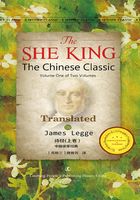
SIN-T'AE
1 Fresh and bright is the New Tower,
On the waters of the Ho, wide and deep.
A pleasant, genial mate she sought,
[And has got this] vicious bloated mass!
2 Lofty is the New Tower,
On the waters of the Ho, flowing still
A pleasant, genial mate she sought,
[And has got this] vicious bloated mass!
3 It was a fish net that was set
And a goose has fallen into it.
A pleasant, genial mate she sought,
And she has got this hunchback.


Ode 18. Narrative and allusive. SATIRIZING THE MARRIAGE OF DUKE SEUEN AND SEUEN KEANG. In the introduction to the notes on ode 9, it has been stated how duke Seuen took to himself the lady who had been contracted to marry his son Keih.It is only necessary to add here, that to accomplish his purpose, he caused a tower to be built on the Ho,where he received the lady on her way from Ts'e and forced her. The general opinion of scholars is that the tower was in the pres. dis. of Kwan-shing (觀城),dep. Ts'aou-chow, Shan-tung.
St. 1. 泚=鮮明, 'fresh and bright'. The Shwoh-wăn quotes the line with 玼, which is, probably, the more correct reading. 瀰瀰 denotes 'the full appearance of the stream'. 燕婉 is explained by 安順, 'quiet and docile', and is understood as a descriptive of Keih-tsze, whom Seuen Këang should have married. Two meanings are given in the dict. to 籧篨. The first is, 'a coarse bamboo mat'; the 2d, 'an ugly disease',which is said to prevent its subjects from a stooping down. Choo observes that if you roll up a bamboo mat, so as to form a sort of grain-barrel, it presents the appearance of a man bloated and swollen, so that he cannot stoop down, and hence the characters were used as a designation of that disease. However we may account for the applications of the terms, they were so employed.—so long ago. The disease must have been dropsy. We are not to suppose that duke Seuen did suffer from this; he is here spoken of as doing so, to indicate his loathsomeness. Choo explains鮮 by 少, 'few'; but I do not see how the word can here be construed with that meaning. I take it, with K'ang-shing, as=善, 'good'.
St. 2. 洒=高峻, 'lofty'. 浼浼 denotes 'the app. of a stream flowing quietly'. Yen Ts'an accepts the account of it as the 'app. of a muddy stream'. Such should be its signification if the character be read mei; but the pronunciation here is mëen; 殄 means 'to cut off', 'to exterminate',—a meaning which is inapplicable here. I must again agree with K'ang-shing, who thinks 殄 was an old form of 腆,=善, 'good'.

